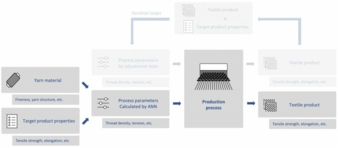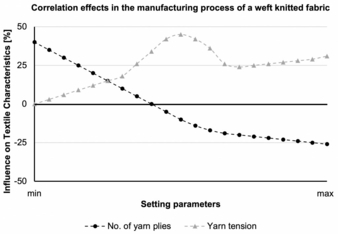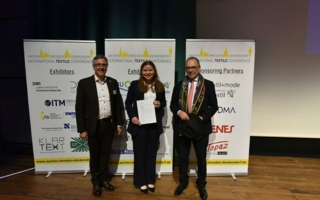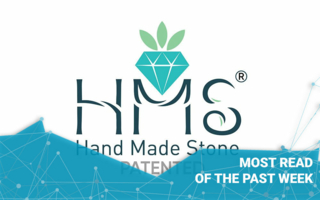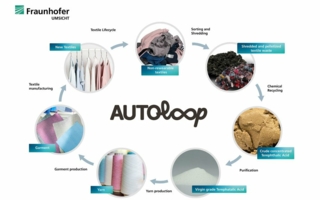22/07/2022 – Digitalization of textile production machines — auf Deutsch lesen
Using AI to develop textile products efficiently
At the Niederrhein University of Applied Sciences, research is being conducted on a system that calculates machine parameters on the basis of material parameters and predefined product properties.
The aim is to make the configuration process of textile production machines more efficient. A system solution for correlating these parameters is based on an artificial neural network (ANN), which is taught using previously generated training data sets.
The textile market is facing enormous challenges due to topics such as sustainability/eco-balance, functionalization and digitalization. The use and development of new highly functional and at the same time sustainably produced materials is increasing rapidly. In order to cope with an increasing number of material variants and a growing complexity of textile products, e.g. through the integration of functional components, production processes have to be designed much more efficiently.
In this context, the adjustment process of textile production machines is of decisive importance. Yarn materials/properties, process parameters as well as product properties contain a multitude of variables, which the machine operator has to adjust to each other through a high degree of know-how and adjustment tests by means of the correct machine setting. Currently, this process is therefore characterized by a large number of iteration loops. There is an enormous potential to save costs, time and material by simplifying the adjustment process of the machine. The research approach is a new possibility of parameter correlation, based on an artificial neural network (see Fig. 1).
Solution approach: artificial neural network
For a more efficient design of the adjustment process of textile production machines, the field of artificial intelligence offers a variety of possible approaches. The goal is to develop a system that is best suited to the specific application area. An essential task in the design and development of such a system is therefore to link the right components together.
In this use case, we are in the area of weak artificial intelligence. Machine learning is a subset of this and can be classified as data analytics. Within machine learning, there are different learning methods. By concrete numerical values describing the product characteristics, the choice falls on “supervised learning”. The goal is a prediction of the necessary machine parameters and is implemented by a regression. Artificial neural networks can be structured in different ways. Due to the complex relationships of the production parameters, a feedforward artificial neural network is used. The artificial neural network is trained using the backpropagation method.
The artificial system described in this way is able to predict the necessary and previously unknown machine parameters based on material parameters and previously defined product properties.
Case study
The function of an artificial neural network is highlighted in the following as an example based on the production of a weft knitted fabric. Determining the requirements for a new product is an essential prerequisite for its development. The weft knitted fabric properties vary depending on the area of application. The first step is therefore to determine the desired requirements with the aim of creating a specification book containing the ordered and measurable product and material properties. The data contained in the specification book serves as a necessary input for the ANN for the solution approach, in addition to the yarn properties.
To implement the specifications, the data from the specifications must be correlated with the machine parameters. The flexible adjustability of weft knitted fabrics is accompanied by a large number of variables to be considered. In addition to the large number of variables, the mutual influence of the variables must also be considered. Figure 2 shows this as an example for the parameters “yarn tension” and “number of yarn plies”. This leads to the fact that the correlation and thus also the adjustment process of a corresponding machine represent a great challenge.
The ANN, which calculates the necessary machine parameters as output on the basis of the input (see Fig. 3), provides a remedy at this point. In the learning process, the ANN has developed a mathematical relationship between all relevant variables and their mutual influence.
The learning process is carried out in advance of the application and ensures that the ANN functions independently. The learning process is based on training data sets. These training data sets are generated by extensive test series on the machine. The data sets contain all information about the manufacturing process. This means that both the input and the output must be given for a training process. For the result quality of an ANN, a high variance of the data sets is crucial. This is achieved by test series with different process constellations. In addition to the variation of individual parameters, changes in the overall constellation are also taken into account.
After the ANN has output the necessary machine parameters, the machine must then be set up for production of the new product, according to the specifications. After setup, the machine is ready for production.
Vision: Simplify machine setting processes
The aim and vision of the research is to develop a system based on an ANN to simplify the setting process of textile production machines. This system is easily accessible for the machine operating personnel, e.g. by means of an application for tablets, as well as directly usable at the machine. With the help of the application, it is possible, on the one hand, to calculate the necessary machine parameters and, on the other hand, to call up and read out the calculated values directly at the machine. In addition, new data can be continuously entered, creating an expert database and thus a personalized enterprise application.
For the implementation of a research project, the Niederrhein University of Applied Sciences is open for cooperation with interested partners from industry.
Kontaktdaten:
Lennart Hellweg
Tel.: +49 2161 186 6159

